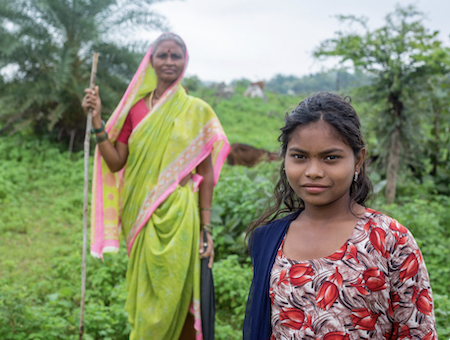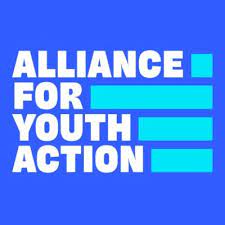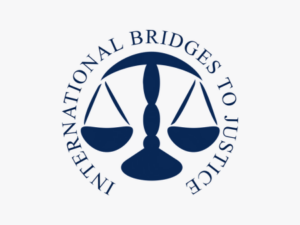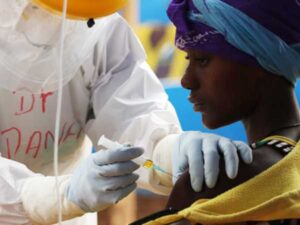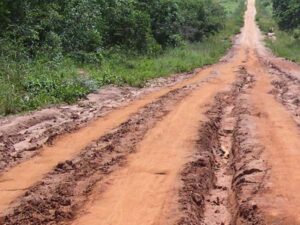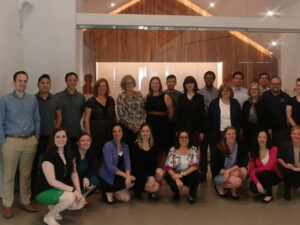Grameen Foundation works with local organizations to bring resources and information to people experiencing poverty, particularly women and girls.
Zubaida Bai of Grameen Foundation USA spoke with Lissa Harris on April 12, 2023. Click here to read the full conversation with insights highlighted.
Lissa Harris: Could you start off by introducing yourself and your organization, and the problem that you’re working on?
Zubaida Bai: I’m Zubaida Bai, I’m the president and CEO of Grameen Foundation, USA. As the name indicates, Grameen is a global organization. We are ecosystem enablers, we are not the bank. The Grameen Bank operates in Bangladesh, and Grameen America operates in the US. We operate globally to build ecosystems with women and girls at the center and to ensure that we create a world without poverty and hunger.
Lissa Harris: Is this direct service with people on the front lines, or do you work with organizations? Who benefits from your work and how do they benefit from it?
Zubaida Bai: The final consumer of all our work, we don’t like to call them beneficiaries, are women at the last mile. We work with hundreds of local organizations on the ground, and with financial institutions, to enable and to create these ecosystems where women and girls can survive and thrive.
Lissa Harris: Can you talk a little bit more about how you interact with them and how they benefit from your work?
Zubaida Bai: Of course. When we say we create ecosystems, we start with household dialogues. In many cases, we enable local partners to have household dialogues, where we dismantle gender and power dynamics at the household level. What happens when a woman starts earning equal to or more than a man? That can lead to gender-based violence. What happens if a woman is capable of making $20, but she can only make $2, because her husband only makes $3? How do you create those household dialogues and dismantle gender and power dynamics?
We work with communities too, with the same gender and power dynamics training program. We work with financial institutions, where we primarily create new loan products. We bring in digital technology and open-source technologies which can help them understand the last mile better. The reduction in interest rates directly passes on. We help create new loan products for a population that banks or financial institutions will never serve, and we help bring down interest rates in a meaningful way, so that people don’t remain stuck in poverty but are able to use their earnings to actually come out of poverty.
Lissa Harris: Can you talk a little bit about how you work with local organizations in the areas where you’re working?
Zubaida Bai: Like I said, we are ecosystem builders. Working with local organizations is a core part of building ecosystems. We don’t necessarily want to create our own office and be there, but we want to build the capacity of local organizations to deliver the content and build ecosystems, so even when we leave the country or the community, the local organizations become the stewards, and the champions for sustainable post-project success. It survives long after we are gone.
Lissa Harris: What makes your approach distinctive from other organizations that are working in your space, that are trying to solve similar problems? What makes you different?
Zubaida Bai: Our founding father, Dr. Yunus, who’s a Nobel Peace Prize winner, his vision for the world is to put poverty in museums and to create a world of three zeros – zero poverty, zero unemployment, and zero climate emission. That’s not possible without creating the ecosystems that we are talking about. Our differentiator is that we lead with gender, we put women and girls at the center, but we don’t leave the men behind. We bring them to the table. We use digital technology and innovation to reach the last mile in a meaningful way, to reduce costs, and achieve scalability, and replicability. The last part of why we are different is, we do believe and we stand for the fact that we don’t empower women. They already have an inherent power in them, because without that you cannot survive poverty. How do you create these enabling ecosystems, and invest in the power of women, so they can reach their full potential? That’s how we are different.
Lissa Harris: Can you share an example that illustrates the impact of your work?
Zubaida Bai: Two verticals of our work are in agriculture and financial inclusion. In agriculture, we’ve been working for the last three years in India, with farmer producer organizations, where we’ve been able to bring women to the forefront. Just in the last two years, we’ve seen the participation of women go up by 200%. In another project we are working on in Myanmar, we potentially could not send our community agents to the last mile so we worked with local partners where we were able to use radio as a communication methodology to train, when we couldn’t send our last mile people in there. In Uganda, we work with refugee communities, especially women, we bring them into the financially inclusive ecosystem and we’ve seen that the women who go through our gender and power dynamics training, our entrepreneurship training, use our digital tools, their income goes up by an average of 26%. I think these would be three tangible examples of how and where we are successful.
Lissa Harris: Is there a personal story or interaction that stands out to you? Is there a beneficiary of your work that you particularly remember?
Zubaida Bai: There are a lot of stories. We have a lot of community agents where we work in Ghana, we treat them as entrepreneurs. They get the gender and power dynamics training from us. The way each one of them navigates their families, their incomes go up, and seeing how they turn it back around to use their incomes for their families. They get out and stay out of poverty. They know that even if this fails, for any reason, we are there to back them up and give them another chance. The stories of each one of our community agents reflects how the added income helps them become a core part of the community, get access to potential livelihood sources, and get agency, which they use to improve their families and bring them out of poverty.
Lissa Harris: What insights or teachable lessons do you think can be taken from your work that others, whether they’re working in this space or in other fields, might use and learn from?
Zubaida Bai: Two insights stand out for me. One is moving away from empowering women and instead enabling them to access their inherent power. I think that’s a huge part of what we do. The second aspect of it is, we always go to women and girls after the fact. We need to create a world with them and for them, and so their insights, their contribution, us creating a financially equitable world for them should have them walk along with us. I think those are two core insights from a gender perspective for us.
Lissa Harris: I’m curious about how you see the distinction between empowering women and girls and letting them access their own power. Can you talk a little bit more about that?
Zubaida Bai: Empowering women puts them at a disadvantage. Who are we to empower anybody? We are not living at the level where they are surviving, and trying with the power that they have. We are going in with, we are here to help you, and I think that’s the wrong approach. They’re not poor because they decided to be poor or because of any fault of their own. We created the systems, we created the channels, we created the capitalist ecosystem, which makes them poor. It has nothing to do with them. So us going in and saying we want to empower you, that feels like an oxymoron in a way. If I came in and said, “Hey Lissa, I want to work with you,” that’s a different story from, “Hey Lissa, I want to empower you.” Right? [The latter] starts with an unequitable platform where I don’t think they need our help. They need us to dismantle what we did wrong, in a meaningful way, so they can live on with their lives.
Lissa Harris: Thank you, that’s helpful. I’m glad I asked. How do you measure your success? What’s the evidence that you use that you’re making progress in these last mile communities?
Zubaida Bai: Our reach is a big indicator of success. The increase in income is a huge indicator of success. The number of women participating in our agricultural workforce, that’s a huge indicator of success. We measure success by financial inclusion and an increase in agency, over a period of time.
Lissa Harris: Have you seen increases in income in every one of the communities that you have been to?
Zubaida Bai: Definitely, because we do provide the tech. We work with populations that are small savings groups, for example, where they do save money but they’re never part of the formal ecosystem. Our technology enables them to convert their transactions into digital records that can give a quasi credit score for a financial agency to take them seriously. That’s a core part of connecting them to formal markets, connecting them to financial ecosystems. I think that’s very important.
With smallholder farmers and corporations in the Philippines, for example. We are not only helping the coconut farmers increase their yield and be climate-friendly, but we are also connecting them to the supply chain of larger corporations for coconut oil. We enable them to get access to financial products for their seeds, for their cultivation, for their insurance, for them to be able to invest in their crops to be able to serve these corporate markets.
Lissa Harris: Are these communities that, if they have access to loans, it’s typically a much higher interest rate?
Zubaida Bai: A much higher interest rate. But, actually, the communities we work with, the women we serve at the last mile, the banks and the financial institutions [don’t serve them]. They only give money to people who have money. We serve that segment of the population, where we are using philanthropic capital to back the loans in a meaningful way, and create new loan products for segments of the population, and de-risk it, so that they can get access to capital.
Lissa Harris: Every social innovator learns as much from things that don’t work as things that do work. Can you describe something that you tried that didn’t work, that taught you an important lesson that maybe others could learn from also?
Zubaida Bai: In our work, when we are very intentional about last mile impact, there are unintended consequences of what we try to do. So we have to be very cognizant of the fact that we enable women to become entrepreneurs – we give them entrepreneurship training – but we want to make sure that doesn’t lead to gender-based violence in her household. We’ve seen instances, or heard of stories where men come in, and they stop their women from working because now she’s making more money than him, and the family doesn’t want that.
We have to be very cognizant. There have been times when it’s happened, and then we want to go in and resolve those issues. That’s where we go back all the way to our household dialogue, so we are able to bring everybody to the table. We understand where the woman is starting from, where she will go, and help everybody understand her journey in a way and support her, rather than stand in her way. We help her progress through the system.
Lissa Harris: Setting aside issues of funding, because everyone struggles with funding, but aside from that, are there challenges that you faced in your work that you haven’t been able to fully overcome or solve?
Zubaida Bai: For us, the big one is we are ecosystem builders. It’s a thankless job. We have to work with various partners and sometimes we do too much. We need to be able to make a case to each one of our partners, to bring them to the table, and manage all these expectations. We are dealing with complex issues, and we are dealing with complex human beings, and in complex situations. It’s not always easy to bring everybody together on the same page, and have everybody aligned towards the same goal. The time and effort it takes to bring all these partners and align goals is one of the big challenges we face.
The other one is primarily from a perspective of, we have a brand name, we are an organization that’s 25 years old, and so people come to us for various segments of our expertise. It’s very hard for us to say no, because that’s important work, but it’s also very hard for us to convince them to say, this piece is not going to be successful without these four or five other pieces. For us, it’s always about bringing different pieces of the puzzle together, making sure everybody understands our vision of when we go into a community and when we come out, when we are no longer needed. We can eliminate an issue by creating this process. Success is hard to scale, and so that’s our last challenge. People always talk about scale, but we are all about replicability. How do you take something from one context to another? It’s not scale, it’s replication, and it’s about creating a new system that will work in that context.
People look at gender issues and say that women are very immobile. These women can’t travel, they can’t go here, and they can’t go there. But in reality, they know their system very well. They can be the change makers within that system, and if you enable them, they can make it long-lasting. They don’t need to scale, we just need to replicate. I think that’s another challenge that the sector’s trying to understand, that not everything is scalable, and not everything is sustainable. There are a lot of actors and a lot of things that need to be moved in parallel for the whole puzzle to fit together and work.
Lissa Harris : I think that leads really nicely into this next question, which is if you could talk about how you’re working to advance systems-level change, broader-level change in your field?
Zubaida Bai: At Grameen, we’ve recently started something, we are calling it market shaping for gender, where we are trying to take the gender and power dynamics training from households, communities, and financial institutions to investors, to philanthropists, to corporations. We want to tell them that you’re investing millions of dollars, unconsciously those millions of dollars, if you don’t understand the gender dynamics of the last mile, that leads to consequences that are not good for the system, for the women, or for our future. How do you take that learning and translate it to various funders, universities where students are getting in and working with gender, to corporations where they’re deciding on where the money goes and what impact it creates. Bringing our gender and power dynamics training to this segment of the population creates an ecosystem that understands gender at the last mile, and are very conscious and intentional about how to create an impact.
Lissa Harris: What do you think is most needed from these other actors and partners, whether that’s financial institutions or philanthropists or the other community groups that you’re working with, to advance the systems-level change that you’re trying to bring about?
Zubaida Bai: I think there is a lot of what we need already happening. Everybody’s cognizant of the fact that gender is the missing piece, and that we really need to push that forward. The one thing that I believe is slowly happening is, trying to take the western norms of gender, and fitting it to the last mile, and to the global south. Trying to take the ecosystem approach from the global north to the global south. I think there is a lot of misconception, and that’s why we really want to shape this market for understanding gender in a meaningful way, so that the dollars are creating the intended impact and we don’t end up creating a system which doesn’t benefit anyone.
Lissa Harris: How do you see your work evolving, and changing over the next five years?
Zubaida Bai: Our focus now is to start working with girls, not just women, but young people between 16 and 19, who in the next three to four years will become a part of the formal financial economy. We want to stop measuring our work from a perspective of, did she take a loan, what interest rate did she get, does she really want to be in debt? We want to move from there to say, can she ask the right questions? If she has the entrepreneurship skills that we are giving her, we don’t want her to use that to become an entrepreneur, but we want her to use it as a life skill. It is the skill to say, I understand finance, I understand entrepreneurship, I’ve interacted with cash.
If somebody’s going to say, I’m going to give you a loan at 42%, she knows to ask why. She knows that if she does not want to get into debt, she does not have to. She knows that having cash does not necessarily mean prosperity. We really want to create the shift of norms in the younger generation today, so they can ask the right questions, understand the meaning of cash and how to interact with cash, and to be able to meaningfully interact with the system in a way that benefits them, and keeps them out of poverty, and not helps them go back into that cycle.
Lissa Harris: Is that something that you’re seeing, vast gulfs in financial literacy between men and women in these communities, or is it really more of a general problem of financial literacy?
Zubaida Bai: I think financial literacy and financial decisions, be it the global north or south, are still made by men in many households. Women philanthropists are known to give less, because they don’t understand how cash works, where it goes. They’re always dependent on the male members of society to advise and guide how to manage money. I think it’s a global problem. However, we believe that when we talk about training girls 17 to 19, we aren’t necessarily talking about leaving the boys behind. Like I said, for us, having men at the table is very important. I think we would do 70-30, that’s where we landed because we want men to understand that women have this agency. We want them to understand the kind of questions, and we want them to walk together into an equitable world, where finance is not necessarily a man or a woman issue, it’s a collective issue, and that there is a trust that is built, there is women allowed at the table, and there is agency of their voice that’s going to be taken seriously.
Lissa Harris: When you first began doing this work on the ground in one of these last mile communities, was there anything that you encountered that you just didn’t expect or surprised you?
Zubaida Bai: I shouldn’t say that it is surprising, but for example, when a woman starts earning, you would assume that family members really want her to use that agency, but then all of a sudden, that becomes a power dynamic of why and how. We’ve also heard about work, where women are taken seriously in certain aspects, but when it comes to finance, their voice isn’t necessarily taken seriously, because they know nothing, which is true, because nobody’s ever spoken to them about cash, they’ve never earned money, they’ve never interacted with cash, they don’t know how to talk numbers. I wouldn’t say it’s surprising, but I do say that it is uncovering certain myths that we go in with. That’s why our gender and power dynamics training with households are the core part of our work. The more we can do it, the more households we can have conversations with, the better individuals can grow on the ladder of the financial inclusion system.
Lissa Harris: Is there anything that we didn’t cover that you thought was important to talk about?
Zubaida Bai: No, I think we’ve pretty much covered everything. Like I said, meaningfully moving away from empowerment and realizing they are doing better than you and I. Surviving with that income in that remote part of the world is not easy, so they are powerful women. They are fighting. We just need to make that fight easier for them. Instead of asking women what they can do, I think the question should be, what do you want to do? There is never an aspirational goal in their life. How do we bring that aspiration, help them understand the financial system, and include them in a meaningful way so they can move out of the cycle of poverty to a cycle of agency? That’s what we need to do, we need to create the steps for them to climb on. We don’t need to tell them how to climb the steps.
Lissa Harris: Wonderful. Thank you very much for your time.
Click here to read the full conversation with insights highlighted.
Lissa Harris is a freelance reporter and science writer (MIT ’08) based in the Catskills of upstate New York. She currently writes about climate, energy, and environment issues from a local perspective for the Albany Times Union, her own Substack newsletter, and various other digital and print publications.
* This interview has been edited and condensed.
Learn about other social innovations in poverty elimination.

